News topics
Monthly Newsletters
// //// //// Online Booking //
// //// // // // // // //
For group bookings please contact
017687 77246 or
contact@derwentwater.org
August 2019
May 2017
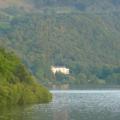
Row, refresh, reflex, recycle, refurbish: recent alliterative themes at the hostel! With three different rowing clubs, the re-opening of our afternoon refreshment service, new mixed recycling bins to finally include plastic, refurbishment of the drying room, and several enthusiastic members from the Reflex Camera Club, the past few weeks have been particularly rejuvenating, aided by long sunny days and lots of birdsong.
We hope you also enjoy reading about our Moss of the Month, thanks to some careful research by Alex, and activities with Allonby Primary, led by Katy. Vicky and Aujke have also been busy, baking different cakes for our tea service, but hopefully you will be able to try those in person.
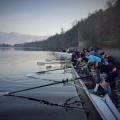
In April we enjoyed meeting three different rowing clubs, thanks to collaborations with Lakeland Rowing Club (based on Derwent Water). First came York City Rowing Club, with their diamond patterned leggings. Then came St Catherine's College, Oxford, followed by Liverpool University Boat Club.
Each group did so much training! The Liverpool lot even carried on rowing off the water, with several rowing machines on the terrace, borrowed from Lakeland Rowing Club. The rowing machines were in use from dawn to dusk, and there were pre-breakfast training sessions every day. Early to bed, early to rise, disciplined, on-time, and polite - perfect groups for the hostel! We hope their hard work pays off with a good season of regattas.

We are very happy to announce that Cumbria County Council will now collect plastic from the hostel, in addition to glass, paper/card, and aluminium. All recyclable materials can go in together, apart from paper/card.
We have put new recycling bins around the hostel, and re-labelled the ones in the courtyard, and so we hope you will make the most of them. Please make sure everything is washed out first though!
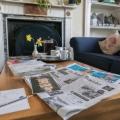
Some of you may know that we used to offer tea and cake before Storm Desmond (Dec 2015). We really enjoyed meeting local people, walkers, and cyclists, and we are delighted to be open again for simple refreshments, every day from 12 to 4.30pm (except for times when we have sole-use groups).
You can sit in the dining room and watch the bird and squirrel feeders, get cosy in the lounge, relax on the terrace and look out at Derwent Water and Skiddaw, run around on the grass, or try the orienteering course.
A pot of tea or coffee is u00a31.50, and we have a small selection of crisps, confectionary, soft drinks, ice cream, beer, wine and cider.

According to the British Bryological Society's "Mosses and Liverworts of Britain and Ireland: A field guide", T. tamariscinum is among the most distinctive of the British mosses (so hopefully I've succeeded in the terrifying task of trying to identify it correctly - fingers crossed). The guide says "[It] grows on soil in woodland, in hedge banks on clay and amongst grass in damp places." The very attractive fern-like shoots can be easily seen from the path alongside the waterfall behind the hostel.
(Thank you Alex.)
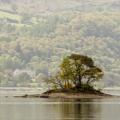
At the beginning of May, 13 members of the Reflex Camera Club, Bristol, came to stay for a week. There was dazzling sunshine every day, and lots of wildlife in the grounds, but the waterfall dwindled to a trickle, so no spectacular waterfall photos! Here is a report from the organiser, Maurice Thompson:
We couldn’t have chosen a better week to visit the Lakes, as the weather was superb. There is enough to keep a photographer busy just around the hostel itself, with the waterfall, jetty, Surprise View and Ashness Bridge within hundreds of metres, and we also benefited from the assistance of a member of the local Keswick Camera Club.
Some of us also travelled in different directions each day, meeting up in the evenings to discuss the day’s adventures and sometimes hearing of mishaps, like falling in the water. We found our stay at the hostel warm and welcoming, with good advice from the staff, and very good living arrangements and comfortable beds. We only had one evening meal on arrival (which was excellent and good value for money) as we were out around the Lakes late into the evening, but we did all have breakfast each morning as we needed to sustain energy for the day. Summing up a very successful trip that we hope to repeat in 2018 to catch the Autumn colours – can’t wait.
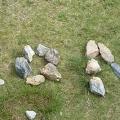
If the oak’s before the ash,
We shall only get a splash,
If the ash precedes the oak,
We shall surely get a soak!
Did anyone notice whether the oaks leafed before the ash in our grounds? Luckily when Allonby came to stay we did not even get a splash, and we hugged lots of leafy oak trees along our way!
On Thursday 18th May, 11 pupils from Years 3 to 6 of Allonby Primary School (Cumbria), came to stay for a one night residential, based on the theme of lakes, Derwent Water in particular of course!
After making their beds and settling in, the pupils went canoeing with Platty+, exploring the southern end of Derwent Water. It was warm and sunny, perfect for splashing about on the lake.
We also had another Cumbrian school group staying, Year 5 from Ghyllside Primary, and it was lovely to see them playing outside with the Allonby children in the evening.
On Friday morning we set out for more explorations of the lake. We started by looking at the meaning of the word ‘Derwent’ (river of oaks); the oak trees in our grounds; the Derwent catchment area and the course of the River Derwent; our route and useful symbols on the OS map and a simplified visitor map; things to look out for on the walk; and a brief history of Derwent Water, ready for some role play on the other side of the lake. Then we walked down to Ashness Jetty, to catch the Keswick Launch to High Brandelhow. On the way to Brandelhow, the Launch stops at Lodore, where Platty+ have their base. It was fun for the children to see where they had been canoeing the previous day.
When we got off the jetty at High Brandelhow, the first task was to find an oak tree to hug; within a short distance there was nearly enough for one each! Then we looked for different cones on the ground, and matched them to the parent trees, identifying Scots pine, Douglas fir, and Himalayan pine. We discussed the difference between deciduous, coniferous, and evergreen trees, of which there is a wonderful variety at Brandelhow.
In a little clearing amongst the Scots pines we discussed the different aspects of the lake: wildlife, uses/activities, inputs, water levels etc, and then we acted out scenes from the history of Derwent Water. We erupted as volcanoes, forming the jagged rocks where the Derwent has its source. Then we became sharp glaciers, deepening the Borrowdale valley. Then we melted into the River Derwent and Derwent Water, with tributary streams flowing down hanging valleys. Gradually, some of us became Vendace fish, one of the first species to emerge after the last glaciation in Borrowdale, and now only found in Derwent Water (and perhaps Sprinkling Tarn and Bassenthwaite). Then two pupils acted out the friendship between St Herbert and St Cuthbert, who died on the same day in 687 AD, with St Herbert living as a hermit on the largest island on Derwent Water. 200 hundred-ish years later, the Vikings arrived, and all the pupils rowed up the River Derwent from Workington to Borrowdale. Then it was time to become German miners, prospecting for minerals on the invitation of Queen Elizabeth I, and living on one of the islands. With the spoil heaps of the old lead mine behind us, and the islands in view on Derwent Water, this seemed particularly real! Continuing with island stories, we acted out some of the eccentricities of Joseph Pocklington, the original owner of Barrow House (our hostel), who also owned Derwent Island in the late 18th century, and then we moved on to Beatrix Potter’s ‘Tale of Squirrel Nutkin’, where naughty Nutkin taunts Old Brown owl on Owl Island (St Herbert’s Island). Using our imaginations, we could see red squirrels rafting across the water to St Herbert’s Island! Then we came up to the present, with pupils becoming launch drivers, kayakers, mountain rescuers, and National Trust rangers.
After that it was time to be ourselves, explore the spoil heaps, and write ‘Allonby’ in pebbles on the grass by Abbot’s Bay. Then we walked round to Manesty, hugging oak trees along the way (so many!) and looking out for cuckooflowers, so named because they are said to flower at the same time as cuckoos begin to call in May. We saw lots of them along the edge of the boardwalk, as well as some bright Marsh marigold.
We stopped by the River Derwent for our packed lunches, looking at the engraving on the bridge (‘Sometimes, if you stand on the bottom rail of a bridge and lean over to watch the river slipping slowly away beneath you, you will suddenly know everything there is to be known’, Winnie the Pooh/AA Milne), and decided that we didn’t really need to go back to school!
We did not have time for poetry by the Lodore Falls, or a game of Duck Duck Goose, but we enjoyed a stroll back to the hostel, in time for a final hug of an oak tree and a re-cap of the residential. I was delighted to hear how much the pupils had absorbed, from the names and folklore of wild flowers, to the best bits of their breakfast!
The Allonby residential was subsidised by our DIH Fund, with free activities from Katy. In the next newsletter we will feature some poems written by the pupils, together with some more photos.
3rd Gateshead Boys’ Brigade Lake District Easter Residential by Ross Cairns
Thursday 13th April
After a few hours’ drive, we arrived at Wasdale to do Ghyll Scrambling with Carol and Richard from Carol Climb. It was quite a cold day so we all got very wet and very cold, but the majority of us still enjoyed it. Once we had eaten lunch and arrived at Derwentwater Hostel, most of us went straight to the drying room to hang up our soaked clothes. Later, we all sat down in the kitchen for our evening meal which was pasta and meatballs. It was very nice and some also had seconds.
Friday 14th April
After a good night’s sleep, we packed our rucksacks ready for our hike. We all then went down to the kitchen for breakfast and filled up ready for the hike. After breakfast, we met at the minibus ready to travel to the bottom of Blencathra. When we arrived, we got out of the minibus and prepared for the hike. We all enjoyed the hike and for most us it was the best part of the weekend. There were lots of great views as we got further up Blencathra and as we got near to the top we had to do a lot of scrambling. When we got to the top, it started to get warmer and the sun finally came out. We had lunch then began the trek back down. When we were back on the minibus, we travelled to Keswick for some free time. After that, we walked back to the hostel and enjoyed the view as we walked along the lakeside. A while later, we went to the kitchen for tea; it was yellow Thai curry.
Saturday 15th April
Following another good night’s sleep, we went down to the kitchen for breakfast. After breakfast, we packed our bags and got ready to leave for sailing. When we arrived at the Platty+ centre at Derwent Water, we got off the minibus and put some extra layers on as it was quite chilly. The sailing was good and everyone enjoyed it, however we were all wet and cold by the end. We had lunch back at the hostel and then drove back home. It was a great weekend for everyone, thanks to the officers, the leaders of the activities, and the hostel.





